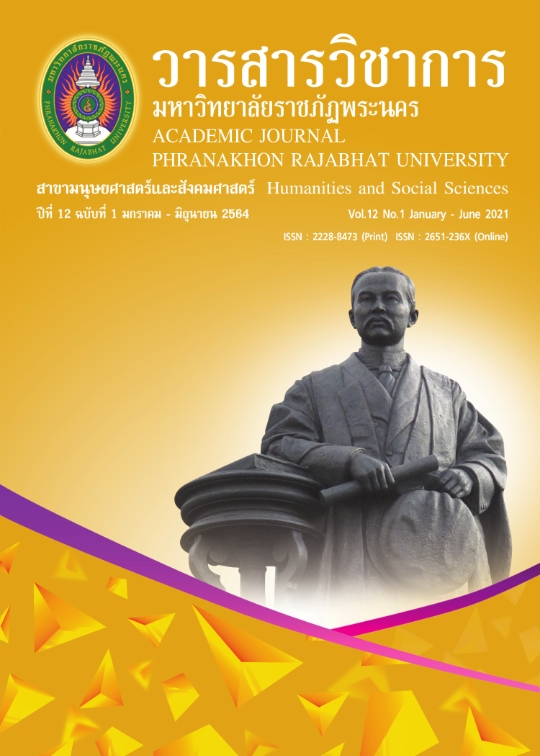STUDENTS’ PERCEPTIONS TOWARDS THE USE OF ENGLISH LANGUAGE ON SOCIAL, ACADEMIC AND PROFESSIONAL CONTEXT
Keywords:
Perception, English, Social, Academic and Professional ContextAbstract
English education in Thailand is still developing with its world academic ranking often found at low level. Local academics blamed the nationwide system that is focusing on grammar and tutoring style to help students simply ‘pass’ the exam, not communicative skills as it should be. There is a call for teachers to communicate in English with students inside and outside classroom as much as possible. This research aimed to understand students’ perceptions towards the use of English on social, academic and professional context. A set of questionnaires was tested with 81 third-year Business English students, Phranakhon Rajabhat University. Five teachers and 10 students were interviewed. The findings: students’ perception towards the use of English on social context is at High level (X̄=3.70), while on academic context is also at High level (X̄=3.81). Their perception towards the use of English on professional context is at High level (X̄=3.71). The respondents reflected a certain level of fear on grammatical use when communicating in English on both social and academic context. In order to succeed in upgrading students’ English ability, the three functions - teachers, students and the university, must take their parts more seriously.
References
Anoop, N. (2017). How many people in the world speak English? Retrieved November 3, 2019, from https://www.quora.com/How-many-people-in-the-world-speak-English
Atagi, R. (2011). Secondary Teacher Policy Research in Asia: Secondary Teachers in Thailand. Bangkok: UNESCO.
Bhuripanyawanich, M. (2018). Interview with BBC. November 5, 2018. Retrieved November 1, 2019, from https://www.bbc.com/thai/thailand-46093794. (In Thai)
Daily News. (2018, March 31). M.6 ONET scores. Retrieved September 15, 2019, from
https://www.dailynews.co.th /education/635550 (In Thai)
Education First. (2018). English Proficiency Index: Thailand. Retrieved October 15, 2019, from
http://www.ef.co.th/epi/regions/asia/thailand/
ETS. (2018). TOEIC 2017 Report on test takers worldwide. New Jersey: Educational Testing Service.
Khamprated, N. (2012). The problems with the English listening and speaking of students studying at a private vocational school in Bangkok. (Master’s thesis). Bangkok: Srinakharinwirot University. (In Thai)
Krisanajinda, S. (2012). Thai teachers destroyed children’s confidence. Retrieved October 1, 2019, from https://www.tcijthai.com/news/2012/11/scoop/1677 (In Thai)
Ping, L. (2004). Creating an atmosphere conducive to English learning. Retrieved October 26, from https://www.semanticscholar.org/paper/Creating-an-Atmosphere-Conducive-to-English-Liping/073a12f9b814d9732d5d123941acb588780be65d Ruangprapan, C. (1996). Basic Statistics. Khon Kaen: Klangnana Wittaya Publishing. (In Thai)
Saad, N.S. (2015). Environmental Conditions for English Language Learning in Malaysia. European Journal of Language and Literature Studies, 1(3), 99-110.
Samarjarn. (2018). All subjects failed in 2018 ONET. Retrieved December 12, 2019, from
http://samarjarn1980.com/srj/index.php?option=com_content&view=article&id=266:-o-et-2561-6 &catid=41:2011-03-10-03-19-54&Itemid=106 (In Thai)
Samkoses, V. (2015). English teachers: educational crisis in Thailand. Retrieved September 3, 2019, from https://www.posttoday.com/politic/report/402500 (In Thai)
Schunk, D. (1995). Self-efficacy, motivation, and performance. Journal of Applied Sport Psychology, 7(2), 112-137.
Wright, C. (2016). Christopher Right’s Interview: Talk to Chomkhwan. (Thairath TV, December 6, 2016). Retrieved June 2, 2019, from https://www.youtube.com/watch?v=20sTLo9OGOU
Yamalee, E. (2018). The challenge of applying English as international language instructional context of Thailand. Ratchaphruek Journal, 16(3), 19-29. (In Thai)
Yan, S. (2005). Effects of anxiety on listening performance and suggestion for improving listening teaching. Shandong University of Science and Technology, China. CELEA Journal, 28(1), 11-17.
Downloads
Published
How to Cite
Issue
Section
License
"บทความวิชาการในวารสารฉบับนี้ ถือเป็นความรับผิดชอบของผู้เขียนเท่านั้น"
สงวนลิขสิทธิ์ตามพระราชบัญญัติลิขสิทธิ์




